- Home
- William Kennedy
Changó's Beads and Two-Tone Shoes Page 2
Changó's Beads and Two-Tone Shoes Read online
Page 2
“You are clearly a born novelist,” Hemingway said.
The beautiful brunette had come in with a man maybe twenty years her senior and they were talking head to head. He was tall and thin, well-tailored in a tan cord suit that his shoulders filled out, white shoes, and yellow tie, a handsome figure who seemed overdressed for the very warm and humid night. He was giving close attention to the young beauty, and it was these two who had drawn the wave from Hemingway.
“What is her relationship to the man?” Hemingway asked.
“Close, but he wants it closer.”
“You are closing in on chapter six.”
“You know her? I saw you wave to her.”
“I waved at the man, Max Osborne,” Hemingway said. “He works in your abandoned profession—an editor at the Havana Post, very smart and also an American spy who talks about his spying to everybody. Some consider him a political buffoon but that seems to be his cover. I know a great deal about spying. I was a spy for several years and they called me a buffoon. They didn’t know twiddle about the Nazis I hunted. Soon Max will come over to talk to us.”
“Will he bring the girl?”
“Yes.”
“Then I won’t have to contrive how to meet her.”
“A lucky day for Mr. Quinn. While we wait we’ll continue our analysis elsewhere. Tell me, who is the biggest jerk in this place?”
Quinn scanned the room and focused on three noisy American men standing at the bar, which was filling up, all tables already occupied. “The man in the sailor straw hat and the orange shirt,” he said.
“We’ll drink a daiquiri and then test out your intuition,” Hemingway said. He ordered the drinks and told the bartender to ask the man in the sailor straw to come over. The three Americans stared at Hemingway and then the man in the orange shirt came down the bar with a two-day growth of beard and a panatela between his teeth.
“How ya doin’, bub?” he said through the cigar. “You wanna talk to me?”
“Just admiring your hat and wondering why you’re in Cuba,” Hemingway said.
“My wife thinks I’m at a sales convention in Miami. But we came down here on an airplane to gamble and check out the women.”
“You’re a sly devil. But this isn’t the best place in Havana to gamble or to find women either.”
“We already found them. Who are you?”
“I’m Dr. Hemingstein and this is my son Daniel. And you?”
“Joe Cooney from Baltimore. What kind of a sawbones are you, Dr. Hemingstein?”
“I’m a doctor of writing. I also actually write stuff.”
“A writer. Hey, I’m a writer too. I write new lyrics for old songs.”
“Could you write a new lyric for Daniel and myself?”
“Sure. Any particular song you like?”
“You know ‘Sliding Down Your Cellar Door’? I learned it as a boy.”
“Sure, I know it. You want me to do new lyrics for it?”
“You think you can?”
“Give me a few minutes I’ll sing ’em for you.”
Joe Cooney went away and everybody smiled.
“So far your intuition is getting high marks,” Hemingway said to Quinn.
The man and the beautiful brunette got up from their table.
“Here comes the bride,” Hemingway said.
Max made his hello and introduced his sister-in-law, Renata Suárez Otero. Hemingway introduced Quinn as his nephew. Quinn stared at Renata to engrave her beauty in his memory. He felt the impulse to take her face in his hand and kiss her before he spoke one word to her. He restrained himself and said only, “Hola.”
“Is she a real sister-in-law, Max, or just cover for your spying on us here?” Hemingway asked.
“I retired from spying last year,” Max said. “You can’t trust anybody anymore.”
“We are related,” Renata said. “Max married my sister, Esme.”
“Esme Suárez. I know Esme,” Hemingway said. “She sang for the troops in Europe during the war.”
“That’s where she met Max.”
“I’ve heard her sing. She has a large talent. Isn’t she in New York?”
“She was working on Broadway,” Renata said, “but she’s back here now.”
“Are you married yourself?”
“I am wondering about it,” she said.
“My nephew Daniel here is also wondering. In fact he was wondering as he looked over at you a few minutes ago. In between his wonderments he’s writing a novel about Cuban gunrunners. He quit the Miami Herald to write his novel and a splendid work it is, with twelve chapters so far.”
“Did you meet the gunrunners, Daniel?” Renata asked.
“I’ve met a few.”
“Are they brave?”
“They seem fearless, sometimes mindless.”
“Do you think they believe in something?” she asked.
“Yes. They believe in death. Do you know any gunrunners?”
“I read about them in the newspapers.”
“Are you an actress? You are so beautiful.”
“I’m learning to be a painter,” she said.
“I would buy several tickets to see your paintings. Where would I do that?”
“I work at Bellas Artes.”
“I’ll come and see you,” Quinn said. “I would like your reaction to my stories on the gunrunners.”
“All right,” said Hemingway, “that’s settled.”
“I have a friend who knew you in Spain,” Renata said to Hemingway. “Carlos Sosa Prieto.”
“The last I saw Carlos government troops were chasing the fascists out of Teruel. A good man. Where is he now?”
“In Havana.”
“I would be glad to see him. Send him mis saludos.”
Joe Cooney came back with a song in his heart. “Are you ready for my lyrics, Dr. Hemingstein?”
“Let me introduce you all to Joseph Cooney, the Baltimore thrush,” Hemingway said. “He’s going to sing an old song with new lyrics he just created for us. Fire away, Maestro.”
Cooney sang enthusiastically and with bounce:“Sliding down your cellar door,
What a thrill I had in store,
Sliding down into the grass,
Twenty slivers in my ass.
Thinking of those days gone by
Brings a teardrop to my eye,
Wond’ring if I’ll ever see
Cellar door that beckons me.
Beckons me forever more,
Slivers from your dear old door.”
Quinn watched Renata, who did not smile at the lyrics. She sees dementia in the man, he decided. Max was amused.
Hemingway leaned over to Quinn and whispered, “You’re right about gooney-Cooney. We’re going to put him away.”
“How so?”
“We’ll have him sing it again and at the finish I’ll throw him a right and cross with a left.”
“You’re a harsh critic,” Quinn said. “Maybe we should just temper our applause.”
Hemingway smiled and spoke to Cooney. “You write lyrics like a poet, like T. S. Eliot. But do it once more with emphasis. It needs emphasis.”
Cooney sang it again and on “Slivers from your dear old door” he took off his hat, raised both arms upward in an embrace of public lyricism, and finished on an emphatic note that turned all heads in the bar. Hemingway hit him according to plan, a right and then a looping left, launching him backward until his head hit the wall near the door, and he slid to the floor. As Hemingway was throwing the left Max saw it rising, ducked sideways, and lost his balance.
“Jesus, Ernest,” Max said, “what was that?”
“Sorry, Max,” Hemingway said, helping him to his feet. “Didn’t have you in mind. That’s two knockdowns with one left.”
Renata’s face registered confusion. “¿Qué es esto? ¿Estás bien?” she said to Max, and took his arm.
“Bien, bien,” Max said, brushing dust off his coat and trousers. “He never laid a g
love on me.”
Renata stared at Hemingway. “So brutal,” she said. “¿Serás estúpido?” and she left at a brisk pace. Max followed her.
Joe Cooney had not moved. His head was cocked against the wall. His two friends went to him and eased him down to lie flat, and a waiter put a towel under his head to blot his blood.
“Get that man to the casa de socorros,” Hemingway said to the bartender. “Está herido. And bring me a filet mignon.”
“¿Crudo?” asked the bartender.
“Raw.”
The waiter went to the street to hail a passing car that would take Cooney to a first aid center. Cooney’s friends were standing over him, staring at Hemingway.
The bartender put a white plate with a raw steak in front of Hemingway, who wrapped it around his right hand. He lifted up the steak and showed his bleeding knuckles to Quinn.
“See this? I’ve been out fishing, and the skin is dry from the salt and the sun. Otro doble,” he said to the bartender.
“I thought you were joking,” Quinn said to Hemingway.
“Jerks are no joke,” he said. “Jerks should not be given houseroom. He said he was a writer. What kind of a jerk says that to a writer and he doesn’t even know who he’s talking to? Jerks and fools are a form of death when they turn up in your face. Singing that song in public is like writing a suicide note. I spent my life looking death in the eye and fighting it.” He paused. “I didn’t tell you what I was writing, did I?”
“No, you didn’t,” Quinn said.
“It’s not a suicide note. I’m reinventing my past in Paris, and I’m coming back with my trilogy,” and he emptied his new double daiquiri with one uptip of the glass. “The land, the sea and the air, and most of it’s been written for years. But there’s a future to think about, and if I put it out all at once we could die of taxation from publication. They’ll get it in time and it’ll knock them all on their ass. You’ll be very proud of me, Mr. Quinn.”
“Didn’t you do the sea in the Old Man?”
“Only part of it. I did that for a woman. There’s more to come, kid. Let’s have two more dobles here. Dos más.”
When Quinn began publishing his own novels in later years he looked at the notes he had made about Hemingway and about himself after this improbable night, and he understood there were important things he had left out, just as Hemingway had left things out when they talked. But as Hemingway had said, you can’t leave out what you don’t know, and in these years he had three novels in progress and could not stop writing them, or make them come together with meaning the way he could in the old days; because now everything had unendingly equal meaning, equal value. And he had left that out when he talked about it. Yet one must persevere. One must defy the forces that try to kill the spirit. One must not only persevere, one must prevail. And so Hemingway kept writing about what it was that was trying to ruin him, and the work became a love song to that. His one-two punches were part of it, just as Joe Cooney’s cellar door was the Cooney love song to his own lack of talent. Witness my absent gift. See how well I apply it.
Failure can also be a creative act, Quinn decided. One must look straight ahead as one makes the forced march backward into used history. The death of ambition, gentlemen, is a great impetus for grasping this, and soon you will thrill to how urgently you are moving, how truly exciting this quest for failure can be. What you do not know at this point is that your quest for failure may also fail.
The waiter came in from the street and said he had found a car to take Cooney. One of the friends pointed to Hemingway as he talked to the waiter, and the waiter nodded. A brawny young black man came in and Hemingway introduced him to Quinn as his driver, Juan. Juan was alert to hostile possibility and stood by Hemingway, monitoring the crowd. Cooney was conscious and talking with his friends, who helped him stand, then walked him to the street.
The crowd in the restaurant stopped watching Hemingway and the tableau he had created, and went back to drinking. A trio of black street singers with guitars came into the bar but a waiter said they weren’t welcome. One of them said they knew Hemingway was here and had written a song for him, “Soy Como Soy” (I am what I am), about a whore who can’t be the woman Hemingway wants her to be. The waiter asked Hemingway if he wanted to hear the song and he said he did. Quinn listened and drank his daiquiri. When the singers finished, Quinn asked them, “Conoce la canción, ‘Sliding Down My Cellar Door’?”
“No, señor,” one singer said.
“Just as well,” Quinn said. “It’s a very sad song.”
Hemingway gave the trio a five-dollar bill.
El Palacio de Bellas Artes was in old Havana, across Parque Zayas from the Presidential Palace, and at late morning Quinn asked for Renata at the information desk. They directed him to a second-floor gallery where he found her with forty high school children, explaining a new exhibit to them—a triptych of paintings inspired by one of the myths of Santeria, the religious cult of the African slaves the Spaniards had brought to Cuba. Quinn only partly understood Renata’s rapid Spanish, but the paintings impressed him, and in days to come he would learn about the long-haired woman and the warrior who were their focus. The woman was Obba, and in the first painting her face was obscured by a white mask with only eyeholes. In the second painting her hair and a scarf covered the left side of her head, because, Renata explained, Obba had cut off her ear to make a meal for her husband—Changó, the warrior king of kings. When Changó realized what Obba had done he rejected her, for he could not live with a mutilated woman. Obba cried for so long and so hard at losing him that her tears created a river, which coursed through the third painting. This Changó was one exalted son of a bitch, Quinn concluded, but Renata made no such judgment. Tragedy was inherent in power, she tried to tell the students, whom she wanted to charm, shock, and instruct in the cruelty of these peculiar-looking gods.
Renata saw Quinn arrive and she smiled at him, not a large smile, and kept talking. She wore a white blouse and black skirt, pedestrian uniform of the museum guides; but she enhanced the uniform, and Quinn decided there was no garment she would not enhance if she wrapped herself in it. The student tour moved on through Spanish, French and Dutch paintings, and at its end Quinn said to her, “Art is long but life is short. Have lunch with me,” and she took him to the American Café near the museum where, she said, she went often. She wanted only coffee.
“I don’t like your friend Hemingway,” she said.
“I can’t blame you for that. He didn’t behave well last night.”
“He hit that man for nothing. The man was singing.”
“That’s why he hit him.”
“You shoot a bird when it sings?”
“He felt insulted by the man’s stupidity.”
“I am insulted by his stupidity.”
“I can’t blame you, but he’s not well, and he thrives on aggression. I don’t want to talk about Hemingway. I want to talk about you. I want to go out with you. Take you to the beach, or dinner, go dancing at some nightclub, anything.”
“I hate to dance.”
“Why?”
“I do it badly. What I do badly I do not do. My mother loves to dance. She won prizes for her dancing.”
“My father was a great dancer. He won prizes for his waltzing.”
“My mother won a prize for waltzing.”
“This is fate. We are children of prize waltzers. We are meant to dance together.”
“I don’t dance.”
“I’ll teach you. I’m a pretty fair dancer.”
“I don’t want to learn dancing. I am learning other things.”
“What things?”
“I’m learning to be in love.”
“I’m sorry to hear that. I wish I could say it was with me.”
“It is others.”
“Others? More than one others?”
“Two others. One is a diplomat in the Argentine embassy. The other teaches anthropology at the university. He is very
fine, the finest man I can imagine.”
“You love the fine one.”
“I love them both.”
“You have a busy love life.”
“It is a curse. They have discovered that I love them both and they are crazy jealous. They are both mad to marry me. The diplomat wants to take me to Europe, but I can’t do that. My mother would kill me.”
“You love the anthropologist more than the diplomat.”
“He needs me more. He’s married.”
“What do you do for him?”
“I drive him and his friends. He has a car but sometimes doesn’t want to drive. I listen when he talks. People call him ‘El Rey,’ the king, because he owns the world wherever he is. He excites me like nobody ever has. But because he is jealous we have a big fight. I don’t know where he is.”
“Why are you sitting here talking to me when you could be with your diplomat or out looking for your fine and powerful king to patch things up?”
“I am fond of you. Instantly. Anoche. You have a manner. You seem to be different.”
“From your lovers?”
“Yes. I think so. You have a way. How you look at a woman. It is possible I could marry you some day, but it is too soon to know.”
“Your mother would kill you. Besides, you don’t want to get married, especially to three men. Or do you?”
“Marriage is exactly what I want.”
“I wouldn’t have guessed it.”
“I think you can be angry. You look angry with me. You looked at Hemingway in anger.”
“Mostly I’m angry with myself. Would you really like to have three lovers at the same time?”
“It is possible. Many women do it. Men have many women, some women have many men.”
“I only need one woman.”
“You are a rare man.”
“You are a rare woman to think I’m rare for needing only one.”
“Men are liars.”
“Women are greater liars and they are better at it than men. Do you want some more coffee?”
“I have to go back to work.”
“I’ll meet you later. We can go to dinner.”
“Maybe another night.”
“Am I on the way to being your third lover?”
“Quizás. But not today. It is too confusing today.”

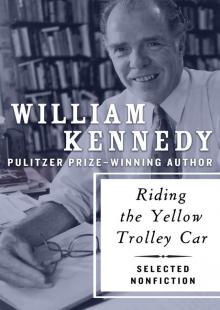 Riding the Yellow Trolley Car: Selected Nonfiction
Riding the Yellow Trolley Car: Selected Nonfiction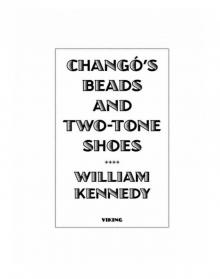 Changó's Beads and Two-Tone Shoes
Changó's Beads and Two-Tone Shoes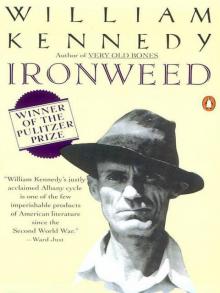 Ironweed
Ironweed The Ink Truck
The Ink Truck Billy Phelan's Greatest Game
Billy Phelan's Greatest Game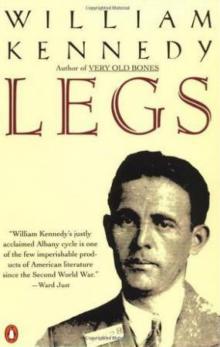 Legs
Legs Very Old Bones
Very Old Bones The Last Mission
The Last Mission The Flaming Corsage
The Flaming Corsage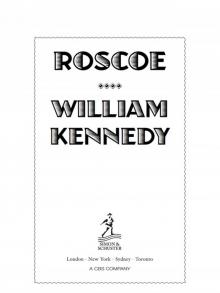 Roscoe
Roscoe Quinn's Book
Quinn's Book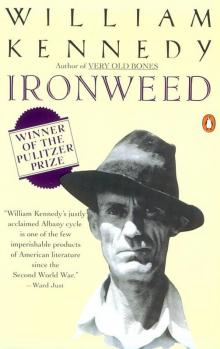 Ironweed (1984 Pulitzer Prize)
Ironweed (1984 Pulitzer Prize)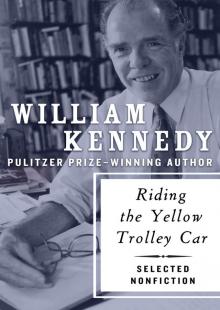 Riding the Yellow Trolley Car
Riding the Yellow Trolley Car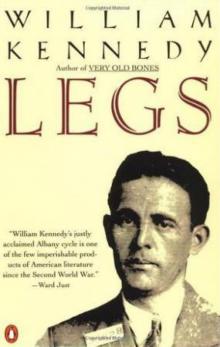 Legs - William Kennedy
Legs - William Kennedy